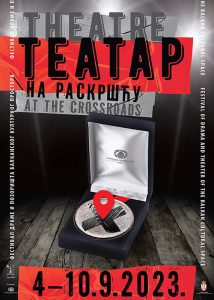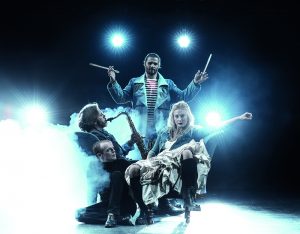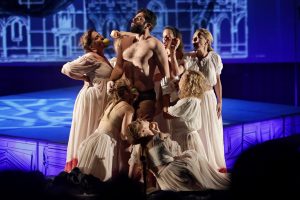
Selection of the fourth theater festival “Theatre at the Crossroads”
The Niš National Theater is presenting the fourth “Theatre at the Crossroads”, a competitive festival of drama and theater of the Balkan cultural space. The festival will be held in Niš from September 4 to 10, 2023.

Festival selector Spasoje Z. Milovanović, MA, chose six plays from Serbia and neighboring countries for the main, competitive part of the Festival:
William Shakespeare MACBETH, directed by Jagoš Marković, National Theater in Belgrade, Serbia (September 4);

J. B. P. Moliere MISERE, directed by Dora Ružđak Podolski, Kerempuh Satirical Theatre, Zagreb, Croatia (September 5);

Aleksandar Popović, NIGHT FRIEND, directed by Branislav Mićunović, National Theater Niš, Serbia (September 6);

Ivo Andrić GOSPOĐICA, directed and adapted by Đurđa Tešić, YU National Theater of the Serbian Republic, Banja Luka, B&H / Serbian Republic (September 7);

Branislav Nušić, THE DECEASED, directed by Egon Savin, Montenegrin National Theater and Tivat Culture Center, Montenegro (September 8);

Staša Prah, FAIR VIDA, directed by Marjan Nećak, co-production of Gledališče Koper – Teatro Kapodistria, Slovenia and the Slovenian permanent theater of Trieste, Italy (September 9);

At the closing of the Festival on September 10, in honor of the awardees, the audience will have the opportunity to see the Niš premiere of the play by Giovanni Boccaccio, THE DECAMERON, directed by Dejan Projkovski, a co-production of YU City Theater Podgorica, Montenegro, Cultural Center Bar – Bar Chronicle Festival, Montenegro, and the National Theater in Niš, Serbia.

On that occasion, awards for the best play, direction, four acting awards, for costume design and scenography, for original stage music, for stage movement, as well as a special Festival award will be presented. Apart from these, the award of the round table of critics and the award of the jury of journalists will be also presented.
In addition to the six competing shows and the performance in honor of the awardees, a rich accompanying program will be held: discussions about the performances, panels, book launches.
The price for the set of tickets for the main program of the Festival, which includes a total of six theater shows (from September 4 to 10), is 3,200 dinars, while the price of an individual ticket for the main program of the Festival ranges from 700 dinars to 1,200 dinars, depending on the show. The sale of tickets and ticket sets starts on 21 August.
The Festival’s program council consists of prominent theater creators from Serbia and the region: Duško Ljuština, PhD, culture manager (Zagreb, Croatia); Vasilka Bumbarova, theatrologist (Sofia, Bulgaria); Dejan Lilić, drama champion (Skopje, North Macedonia); Miloš Latinović, playwright and writer (Belgrade, Serbia); Miroslav Radonjić, PhD, theatrologist (Novi Sad, Serbia), in accordance with the Festival’s legal regulations, the mayor of Niš, Dragana Sotirovski, tourism expert and the general manager of the National Theater in Niš, Spasoje Ž. Milovanović, MA, theatrologist, who is also the festival director and selector.
The expert jury of this year’s festival consists of: prof. Nenad Novaković, Ph.D., expert in electronic media and cultural management (B&H), Irena Šarović, ballerina, choreographer and dramaturg graduate (Serbia), Vasil Vasilev, theater director and general manager of the National Theater “Ivan Vazov” in Sofia (Bulgaria), Milica Bajić Đurov , scenographer and costume designer (Serbia) and Dušan Kovačević, actor and artistic director of the YU City Theater in Podgorica (Montenegro).
Since this year, the festival has the status of a manifestation of importance in the field of culture for the city of Nis.
The Festival “Theatre at the Crossroads” aims to affirm the similarities and differences of the cultural identity of the countries and peoples that share the same cultural space, the affirmation of the state of Serbia and the city of Niš as a crossroads of European and global roads, the strengthening of international cultural exchange, the promotion of theater art of the Balkan cultural space, as well as the exchange of ideas and theatrical practices.
 srpski
srpski English
English